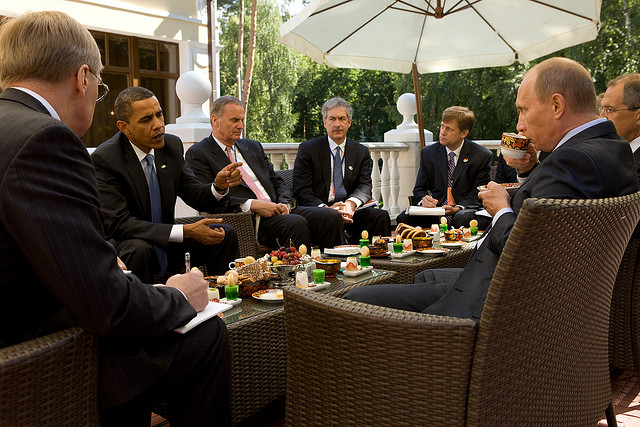
Although the situation in Syria and the actions of Bashar al-Assad long ago passed any criteria by which a humanitarian crisis may be defined, a mix of factors has prevented any international moves that would bring about a decisive change in the country’s tragic circumstances.
The United Nations-backed doctrine of a responsibility to protect, the third leg of which enshrines the point ‘If a State is manifestly failing to protect its populations, the international community must be prepared to take collective action to protect populations, in accordance with the Charter of the United Nations’ seems unlikely to have any effect on the Syrian situation. Implementing the doctrine of ‘responsibility to protect’ was always going to be governed by what big powers saw as being in their strategic and possibly in their short-term interests. Syria will long remain a classical case to study.
The overriding concern of those countries that could alter the balance of forces within the country by supplying major weapons to the forces opposing Syria’s President is that those weapons might find their way into the hands of al-Qaeda or other terrorist groups. It would be hard to deny this is a possibility.
President Obama’s native caution about the prospect of the United States being dragged into another Middle East war has been (and will remain) a major feature in developments over Syria. The US revised its policy on arming the opposition groups after the Assad regime used chemical weapons—but even then the US President kept shifting the point at which the red line had to be crossed. It’s no wonder that President Obama is cautious. The US is weary of wars, glad to have its troops out of Iraq, anxious to get its troops out of Afghanistan safely, and certainly not looking for other Middle East places to send them.
A further constraint on international action is that however bad Assad might be, whoever or whatever replaces him might be no better, or even worse. That consideration influences Russia every bit as much as it influences Western countries.
It was certainly one of the factors that influenced Vladimir Putin to oppose any resolution in the UN about supporting the Syrian opposition. He was also influenced by the fact that the initial UN resolution on a no-fly zone in Libya was later interpreted as allowing a NATO bombardment and ultimately regime change. He’s not going to allow the possibility of the same thing happening again.
The fact that the US and Russia have at least the appearance of being on different sides over Syria has led some commentators to speculate about a ‘proxy war’, a description that appears to me to be neither historically nor strategically parallel to events during the time of the Soviet Union. All the same, the US doesn’t want to alienate Russia if it can help it.
Then there’s the whole Sunni–Shia split in the Middle East, bedevilled by Iranians fighting on Assad’s side and Sunnis backing the opposition. Some Sunnis are trying to get advanced weaponry to the opposition forces, sometimes thwarted by Turkey preventing its territory being used for transit. Sunnis are criticising the US and other Western countries for not giving the Syrian opposition forces major weaponry. The Sunni–Shia split shows signs of creating more divisions in more countries in the Middle East. If the US supplies major weapons to the Syrian opposition, that’s likely to be seen as the US helping the Sunni side and alienating the Shia side—not a position the US wants to be seen taking.
The US might also be influenced to a limited extent by the hope that shale oil will greatly lessen US dependence on oil imported from the Middle East, thereby reducing some of the importance of the region to the US. These conditions and constraints won’t be reproduced precisely in other countries in which, like Syria, the circumstances cry out for something to be done.
Nevertheless, it’s hard to believe that there will be an uncomplicated case needing intervention or an easy case of exercising the ‘responsibility to protect’. Those looking for better precedents won’t be reassured by Libya, now very messy internally, and a factor in making countries cautious about Syria.
A reluctance to intervene may need to be balanced against the disadvantages of failing to intervene. The risks of alienation from one side will have to be weighed against losing influence and strategic advantages on all sides. That may yet help shape events in Syria.
Stuart McMillan is an adjunct senior fellow in the school of social and political sciences at the University of Canterbury. Image courtesy of Flickr user The White House.

